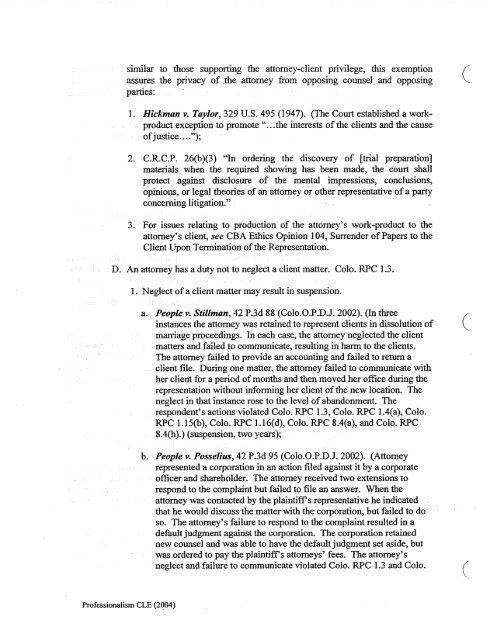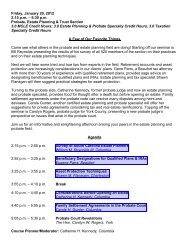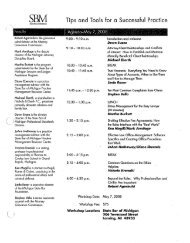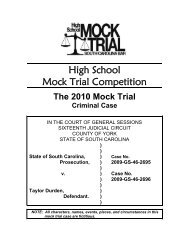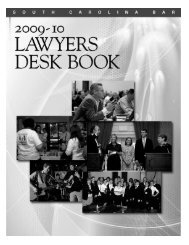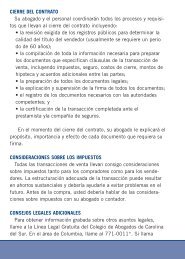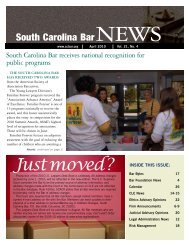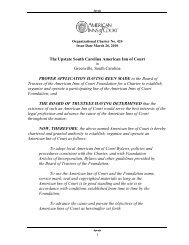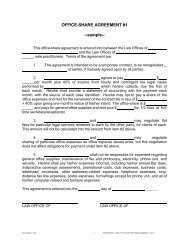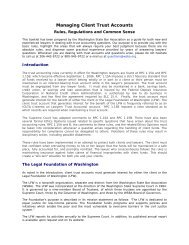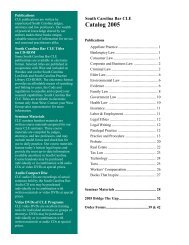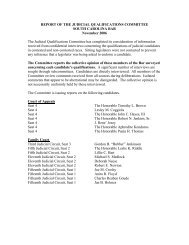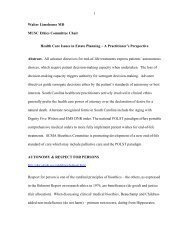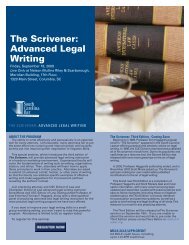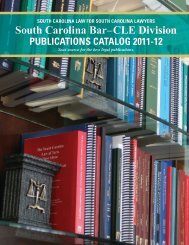Practicing With Professionalism - South Carolina Bar Association
Practicing With Professionalism - South Carolina Bar Association
Practicing With Professionalism - South Carolina Bar Association
Create successful ePaper yourself
Turn your PDF publications into a flip-book with our unique Google optimized e-Paper software.
similar to those supporting the attorney-client privilege, this exemption ("<br />
assures the privacy of ,the attorney from opposing counsel and opposing<br />
'-,<br />
parti~s:<br />
1. Hickman v. Tay/or, 329 U.S. 495 (1947). (The Court established a workproduct<br />
exception to promote .....the interests ofthe clients and the cause<br />
ofjustice....");<br />
2. C.R.C.P. 26(b)(3) "In ordering the discovery of [trial preparation]<br />
materials when the required showing has been made, the court shall<br />
protect against disclosure of the mental impressions, conclusions,<br />
opinions, or legal theories ofan attorney or other representative ofa party<br />
concerning litigation."<br />
3. For issues relating to production of the attorney's work-product to the<br />
attorney'scli~nt, see CBA Ethics Opinion 104, Surrender ofPapers to the<br />
Client Upon Termination ofthe Representation.<br />
D. An attorney has a duty not to neglect a client matter. Colo. RPC 1.3.<br />
1. Neglect ofa client matter may result in suspension.<br />
a. People v. Stillman, 42 P.3d 88 (Colo.O.P.D.J. 2002). (In three C·<br />
instances the attorney was retained to represent clients in dissolution of _<br />
marriage proceedings. In each case, the attorney neglected the client<br />
matters and failed to communicate, resulting in harm to the clients.<br />
The attorney failed to provide an accounting and failed to return a<br />
clientfile..During one matter, the attorney failed to communicate with<br />
her client for a period ofmonths and then moved her office during the<br />
representation without informing her client ofthe new location. The<br />
neglect in that instance rose to the level ofabandonment. The<br />
respondent's actions violated Colo. RPC 1.3, Colo. RPC 1.4(a), Colo.<br />
RPC l.15(b), Colo. RPC l.16(d), Colo. RPC 8.4(a), and Colo. RPC<br />
8.4(h).) (suspension, two years);<br />
b. People v. Posse/ius, 42 P.3d 95 (Colo.O.P.D.J. 2002). (Attorney<br />
represented a corporation in an action filed againstit by a corporate<br />
officer and shareholder. The attorney received two extensions to<br />
respond to the complaint but failed to file an answer. When the<br />
attorney was contacted by the plaintiff's.representative he indicated<br />
that he would discuss'the matterwith the corporation, but failed to do<br />
so. The attorney's failure to respond to the complaint resulted in a<br />
default judgment against the corporation. The corporation retained<br />
new counsel and was able·to have the default judgment set aside, but<br />
was ordered to pay the plaintiff's attorneys' fees. The attorney's<br />
neglect and failure to communicate violated Colo. RPC 1.3 and Colo. (<br />
<strong>Professionalism</strong> CLE (2004)


